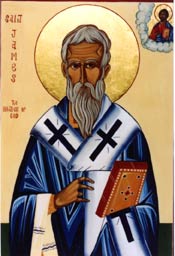Readings:
Eucharistic:
Acts 15:12-22a
Psalm 1
1 Corinthians 15:1-11
Matthew 13:54-58Preface of All Saints
Daily Office:
AM: Psalm 119:145-168
Jeremiah 11:18-23
Matthew 10:16-22
PM: Psalm 122, 125
Isaiah 65:17-25
Hebrews 12:12-24
PRAYERS (traditional language)
Grant,
we beseech thee, O God, that after the example of thy servant James the
Just, brother of our Lord, thy Church may give itself continually to prayer
and to the reconciliation of all who are at variance and enmity; through
the same our Lord Jesus Christ, who liveth and reigneth with thee and
the Holy Spirit, one God, now and ever. Amen.
PRAYERS (contemporary language)
Grant, O God, that, following
the example of your servant James the Just, brother of our Lord, your
Church may give itself continually to prayer and to the reconciliation
of all who are at variance and enmity; through Jesus Christ our Lord,
who lives and reigns with you and the Holy Spirit, one God, now and ever. Amen.
Return to Lectionary Home Page
Webmaster: Charles Wohlers
Last updated: 23 October 2009
JAMES OF JERUSALEM
BISHOP AND MARTYR (23 OCT NT)
 James
of Jerusalem is referred to in the New Testament as the brother of Our
Lord Jesus Christ.
James
of Jerusalem is referred to in the New Testament as the brother of Our
Lord Jesus Christ.
He was for many years the leader of the Christian congregation
in Jerusalem, and is generally supposed to be the author of the Epistle
of James, although the Epistle itself does not state this explicitly.
James is mentioned briefly in connection with Jesus' visit
to Nazareth (Matt. 13:55; Mark 6:3).
We are told that Jesus' brothers did not believe in Him (John
7:2-5), and from this, and from references in early Christian writers,
it is inferred that James was not a disciple of the Lord until after the
Resurrection.
Paul, listing appearances of the Risen Lord (1 Cor 15:3-8),
includes an appearance to James.
Peter, about to leave Jerusalem after escaping from Herod,
leaves a message for James and the Apostles (Acts 12:17). When a council
meets at Jerusalem to consider what rules Gentile Christians should be
required to keep, James formulates the final consensus (Acts 15:13-21).
Paul speaks of going to Jerusalem three years after his conversion
and conferring there with Peter and James (Gal. 1:18-19), and speaks again
of a later visit (perhaps the one described in Acts 15) on which Peter,
James, and John, "the pillars," placed their stamp of approval
on the mission to the Gentiles (Gal. 2:9).
A few verses later (Gal. 2:11-14), he says that messengers
from James coming to Antioch discouraged Jewish Christians there from
eating with Gentile Christians. (If this refers to the same event as
Acts 15:1-2, then Paul takes a step back chronologically in his narration
at Gal. 2:11, which is not improbable, since he is dictating and mentioning
arguments and events that count as evidence for his side as they occur
to him.)
On his last recorded visit to Jerusalem, Paul visits James
(others are present, but no other names are given) and speaks of his ministry
to the Gentiles (Acts 21:18).
Outside the New Testament, James is mentioned by the Jewish
historian Josephus, who calls him "the brother of Jesus the so-called
Christ," and reports that he was much respected even by the Pharisees
for his piety and strict observance of the Law, but that his enemies took
advantage of an interval between Roman governors in 62 AD to have him
put to death. His death is also reported by the second-century Christian
writer Hegesippus.
Numerous references in early Christian documents show the esteem in which he was held in the early Church.
There appear to be at least three persons named James mentioned in the New Testament, and possibly as many as eight. For an attempt to sort them out, see the BIO of Philip and James at 1 May.
by James Kiefer